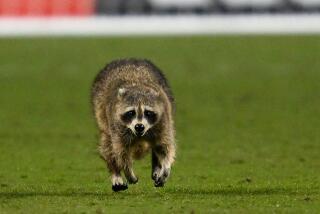Retailers pull fur-trimmed coats after dog hair is found
- Share via
WASHINGTON — That fur trim on your jacket that you think is fake? Tell it to Fido.
An animal advocacy group says its investigation has turned up coats -- some with designer labels, some at higher-end retailers -- with fur from man’s best friend. Some retailers were scrambling to pull the coats from shelves, take them off websites and even offer refunds to consumers.
The Humane Society of the United States said it purchased coats from reputable retailers, such as upscale Nordstrom Inc., with designer labels -- Andrew Marc and Tommy Hilfiger, for example -- and found them trimmed with fur from domestic dogs, even though the fur was advertised as fake.
“It’s an industrywide deception,” said Kristin Leppert, the head of the Humane Society’s anti-fur campaign.
The investigation began after the society got a tip from a consumer who bought a coat with trim labeled as faux fur that felt real. Leppert and her team began buying coats from popular retailers and then had the coats tested by mass spectrometry, which measures the mass and sequence of proteins, to determine what species of animal the fur came from.
Of the 25 coats tested, 24 were mislabeled or misadvertised.
Three coats -- from Tommy Hilfiger’s website ShopTommy.com, Nordstrom.com and Andrew Marc Inc.’s MARC New York line sold on Bluefly.com -- contained fur from domesticated dogs. The others had fur from raccoon dogs -- a canine species native to Asia -- or, in one case, wolves. The single correctly labeled coat was trimmed with coyote fur, but it was advertised as fake.
Most of the fur came from China.
In response to the Humane Society’s investigation, Tommy Hilfiger stopped selling the fur-trimmed garment and said it was looking into the matter. “We were quite concerned to hear of this finding,” spokeswoman Wendi Kopsick said.
Nordstrom called the 62 consumers who had purchased vests with dog fur trim to give them the opportunity to return the vests “because we would never want to deceive our customers in any way,” Nordstrom spokeswoman Brooke White said. She said Nordstrom no longer buys fur-trimmed products from the vendor, who had marketed the vests as faux fur.
Charles Jayson, chief executive of Andrew Marc, disputed the Humane Society’s investigation and insisted in a statement that all fur on his coats labeled as raccoon contained “only farm-bred raccoon fur from Finland, and our items labeled ‘faux fur’ are a 100% synthetic fabric.”
Importing domestic dog and cat fur was outlawed in 2000. Intentionally importing and selling dog fur is a federal crime punishable by a $10,000 fine for each violation. Michael Markarian, executive vice president of the Humane Society, said his group had contacted all the retailers and designers selling mislabeled coats or coats with dog fur.
Raccoon dogs look like oversized, fluffy raccoons and aren’t kept as pets. Importing their fur is not illegal, but activists say they are still a type of dog.
“This is an animal that is routinely killed by stomping them or beating them or skinning them alive,” Markarian said. Video produced by Swiss Animal Protection and posted on the Internet shows raccoon dogs being clubbed or slammed on the ground. Some writhe, gasp and blink as they are skinned alive.
The discovery of domestic dog fur is the latest twist in the investigation that spotlighted retail giants Macy’s and J.C. Penney Co. late last year. Both retailers were found to be selling coats with raccoon dog fur labeled as raccoon.
Burlington Coat Factory Direct Corp. also pulled some coats with mislabeled fur from its shelves. Rap artist Sean “Diddy” Combs stopped producing and selling coats from his Sean John line that had raccoon dog fur, and rapper Jay-Z pulled coats with raccoon dog from his Rocawear label.
Mislabeling fur is a misdemeanor punishable by a $5,000 fine or a year in prison. Fur valued at less than $150 is not required to be labeled.
A bill introduced by Reps. Jim Moran (D-Va.) and Mike Ferguson (R-N.J.) would close that loophole by requiring labels for all fur products regardless of their value. It also would ban fur from raccoon dogs.
“Americans don’t want Lassie turned into a fur coat,” Moran said. “In the U.S., we treat cats and dogs as pets, not trimmings for the latest fashion wear.”
The Humane Society said other retailers that had sold mislabeled raccoon dog fur included Lord & Taylor, BergdorfGoodman.com and NeimanMarcus.com. Designers whose clothes were mislabeled included Donna Karan’s DKNY and Michael Kors. A coat from Oscar de la Renta advertised as raccoon had raccoon dog fur.
Neiman Marcus Group Inc., which owns Bergdorf Goodman, said it removed Bogner and Andrew Marc coats from its websites. Michael Kors said it was investigating, and a DKNY spokeswoman said the label was unaware that raccoon dog fur had been used.
Donna Karan’s executive vice president for global marketing and communications, Patti Cohen, said, “While it is not illegal to use this type of fur, we have taken measures to ensure that it is never again used for any of our products.”
A spokeswoman for Oscar de la Renta declined to comment.
More to Read
Inside the business of entertainment
The Wide Shot brings you news, analysis and insights on everything from streaming wars to production — and what it all means for the future.
You may occasionally receive promotional content from the Los Angeles Times.









